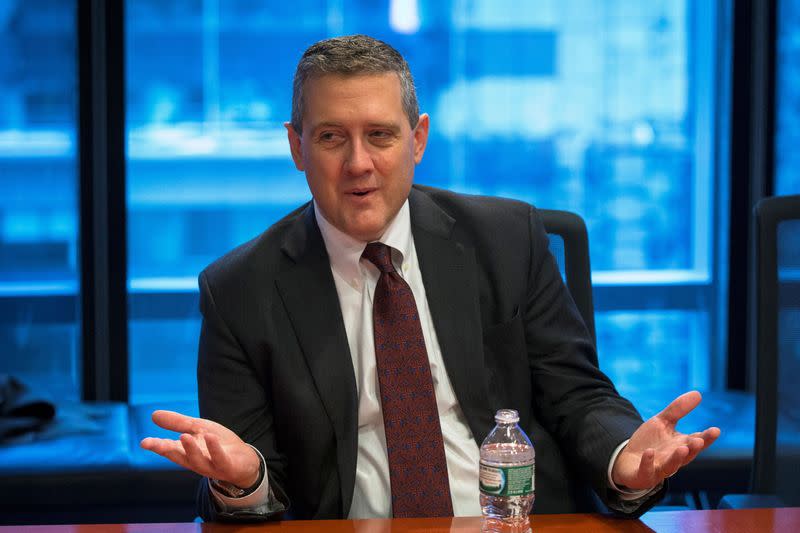Fed officials still leaning to 75-basis-point rate hike in July
By Howard Schneider and Lindsay Dunsmuir
TAMPA, Fla. (Reuters) -Federal Reserve officials signaled Friday they will likely stick with a 75-basis-point interest rate increase at their July 26-27 meeting, though a recent high inflation reading could still warrant larger increases than anticipated later in the year.
Data released earlier this week showing inflation had accelerated to an annual rate of 9.1% in June raised the possibility the Fed might opt for a larger 1 percentage point rate hike at its next session.
But comments from Fed officials on Friday, coupled with data showing economic activity holding up and the inflation outlook among consumers improving, undercut some of the urgency for a larger increase.
St. Louis Fed President James Bullard, among the chief advocates of quicker and larger rate increases, said the "hot" inflation reading for June warrants pushing the target federal funds rate to a range of between 3.75% and 4.00% by the end of this year, a half percentage point higher than his prior year-end aim.
"The Fed has to react ... charting out a course that is somewhat more aggressive over the second half of this year," Bullard said at an event organized by the European Economics & Financial Centre in London.
But he also said he was indifferent about whether the U.S. central bank approves a 0.75-percentage-point rate increase this month, as policymakers have flagged, or boosts that to a full percentage point.
"It probably doesn't make too much difference to do 100 basis points here and less in the other three meetings (in 2022) or to do 75 basis points here and slightly more in the remaining three meetings of the year," Bullard said.
In separate comments at a forum organized by the Tampa Bay Business Journal, Atlanta Fed President Raphael Bostic cautioned against the central bank moving "too dramatically" because it could undermine the strong hiring and other positive trends still seen in the economy.
While Bostic did not explicitly endorse a 75-basis-point increase at this month's meeting, his comments seemed to lean away from a larger rate hike in July.
Their remarks are the last before policymakers enter a "blackout" period in which they are supposed to refrain from public statements in the week before the central bank's policy-setting Federal Open Market Committee gathers.
Traders in futures contracts tied to the Fed's short-term federal funds policy rate shifted their bets firmly in favor of a 0.75-percentage-point increase at the upcoming meeting following the two Fed officials' remarks. Traders had been leaning toward a full-percentage-point jump since the Labor Department reported on Wednesday that consumer prices rose at an annual pace of 9.1% in June, the largest increase in more than four decades.
BASE CASE
Both Bostic and Bullard reiterated the Fed's firm commitment to raising interest rates as high as needed to control inflation, with Bostic saying "if the economy moves in a way that is consistent with us getting to our 2% (inflation) target then we will stop. And if it doesn't we won't."
That promise is being weighed against increased concerns that the Fed's efforts, which have already prompted large jumps in home mortgage interest rates and other forms of credit that directly hit household and businesses bottom lines, will lead the economy into recession.
Both TS Lombard and Bank of America on Friday said they now expect the U.S. to enter recession later this year.
Data released Friday showed key parts of the economy still resilient.
Retail sales rebounded in June, though they were down slightly on an inflation-adjusted basis, while a New York Fed manufacturing index registered unexpected gains.
Meanwhile, a closely watched measure of consumer inflation expectations improved in June, what ISI Evercore vice chairman Krishna Guha deemed a "lucky break" for Fed officials worried they were losing control of the public inflation outlook and would need to act more aggressively to keep it "anchored."
A jump in consumer inflation expectations in part prompted Fed policymakers in June to shift from an expected 0.5 percentage point rate increase to the larger 0.75 percentage point hike - a move meant to signal the Fed's commitment to the inflation battle but which also amplified recession risks.
In comments to online news site Newsy, San Francisco Fed president Mary Daly on Friday said that with the economy and labor market both strong, "I'm not concerned about overcooking things" and sparking a recession.
The Fed isn't going to raise rates to an "extreme range," she said. "We're talking about raising the interest rate from close to zero, which is where it was during the entire pandemic that we just went through to something more like in the 3% range....I don't have recession high on my list of outcomes."
(Reporting by Howard Schneider and Lindsay Dunsmuir; additional reporting by Ann Saphir Editing by Paul Simao and Chizu Nomiyama)




